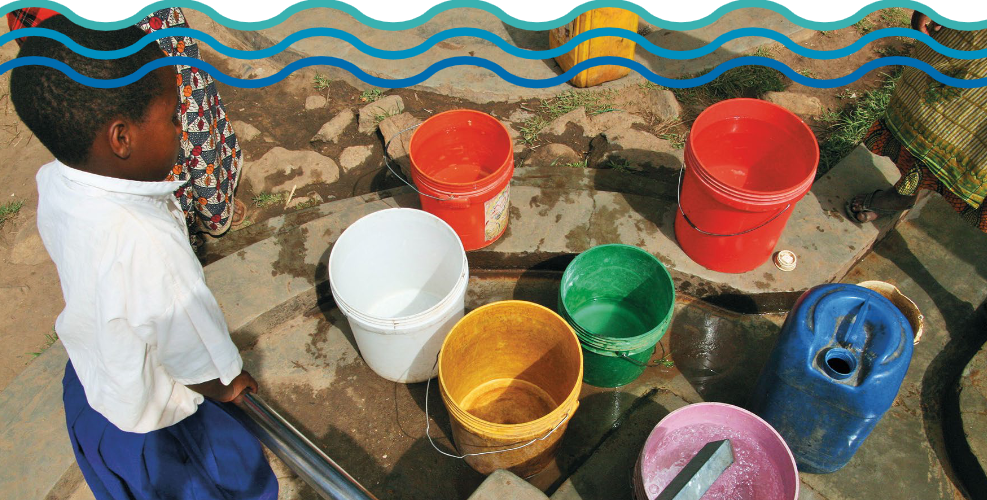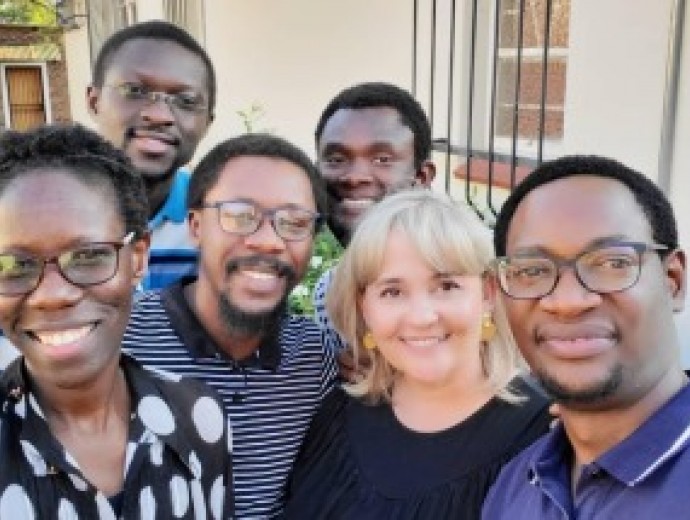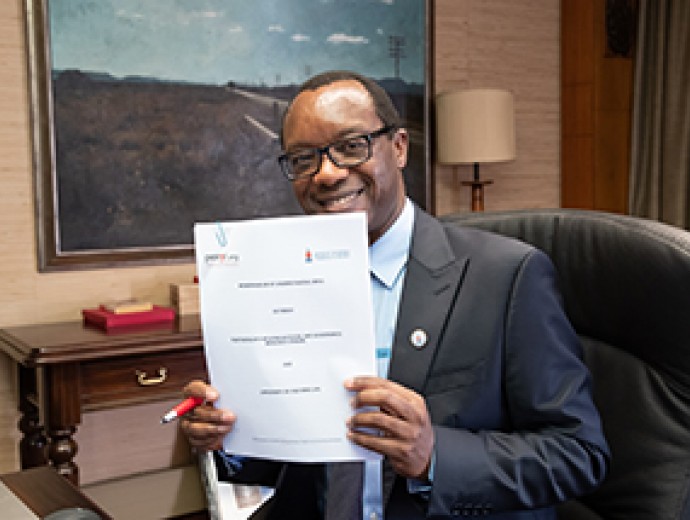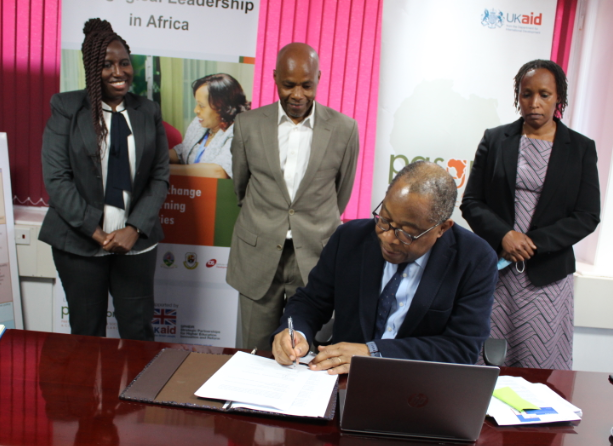Background
Pedagogical Leadership in Africa (PedaL) is a partnership of eight institutions whose aim is to catalyse systemic change in teaching and learning in African universities. The Partnership for African Social and Governance Research (PASGR) is the Prime Agency, leading 7 other partners including Alliance for Research Universities in Africa (ARUA), Institute of Development Studies (IDS) of the University of Sussex, UK; as well as five implementing partner universities. The implementing partner universities are namely, the University of Ghana in Ghana, University of Ibadan in Nigeria, University of Dar es Salaam in Tanzania, Egerton University in Kenya and Uganda Martyrs University in Uganda. PedaL was designed around four phases, namely planning and delivery preparations; training and graduated roll out of PedaL in social science programmes of 5 core partner universities; sustainability planning and scale-up; and finally evaluation as the last phase. The project has been in operation since July 2017 and is expected to end in September 2021.
Purpose of the Assignment
PedaL embodies three key interventions: training; application of newly learnt teaching and learning methods (PedaL pedagogy) to deliver social science programmes; and leadership that entails influencing others to replicate PedaL for greater impact. The consultant/evaluator will lead the evaluation of PedaL with the view to provide information and knowledge about what has been achieved, how, and what lessons to derive from this, for the partnership and other stakeholders. The evaluation will go beyond impact in line with the PedaL theory of change to establishing the mechanisms under which the results have been achieved. The evaluation will further seek to understand what elements of PedaL have contributed significantly to the transformation of teaching and learning in the target higher education institutions; and how positive relationships and trends that have emerged can be sustained and enhanced.
Findings and conclusion from the evaluation will be shared with the PedaL and SPHEIR partnerships as well as wider interested groups including higher education institutions, networks, and knowledge systems in Africa and beyond.
Scope of the Work
The evaluation should review all aspects in line with the PedaL theory of change from its inception in May 2018 to date. The consultant will be expected to implement a robust evaluation approach that would yield defensible and credible findings. The project evaluation will cover the quality and quantity of PedaL outputs spanning all university programmes that have implemented PedaL across the continent. The teaching staff trained and others that they have engaged as well as the students who have participated in target PedaL programmes will also be engaged; so will other stakeholders such as potential employers and policymakers at different levels. PedaL has trained over 1,000 teaching staff from the five implementing partner universities (University of Dar es Salaam, Egerton University, University of Ghana, University of Ibadan and Uganda Martyrs University) and more than 50 other African universities. PedaL evaluation will be aimed at establishing the impact of project interventions specifically on 25 graduate social science programmes of the five universities, as well as the spillover effect on other programmes within and without the core universities. The focus will also be on the range of outcomes leveraged from PedaL and the extent to which these outcomes can be sustained to create the expected impact. The evaluation, which is to begin in August, is estimated to last for a maximum of 5 months, with the final report expected out by March 2021.
Evaluation Objectives
The evaluation will be aimed at establishing, among other things the effectiveness, efficiency, sustainability, and impact of PedaL:
- Effectiveness – whether PedaL is producing the expected results;
- Efficiency – whether PedaL outcomes were achieved with the least possible resources;
- Sustainability – whether PedaL outcomes can be maintained over a long period of time; and,
- Impact – whether the benefits accruing from PedaL outcomes extend beyond the direct beneficiaries in a way that influences the higher education ecosystem in Africa.
The consultant will need to explore intended and unintended outcomes for purposes of accountability and, more importantly, for learning within and beyond the partnership.
Accordingly, the objectives of the evaluation are to:
- Independently verify (and supplement where necessary), the record of achievement of the project as reported through its annual reports and defined in the project results framework;
- Analyse the extent to which factors that have influenced the achievement of project outcomes can be leveraged for the sustainability of PedaL;
- Suggest recommendations for improving the programme’s design and implementation for scale-up and sustained impact.
Evaluation Criteria
The evaluation will use these five standard criteria: relevance, effectiveness, efficiency, impact, and sustainability.
Method of the Evaluation
The impact of PedaL is expected to be assessed through teaching staff and students’ perceptions of learning experiences and assessment of student learning outcomes. These will be explored through teaching staff and student surveys, review of teaching and learning materials, review of student and teaching staff artifacts as well as in-depth case studies, and other process tracing methodologies. Although a theory-based approach is preferred for PedaL evaluation, the consultant will be expected to apply a mixed-methods approach to allow for triangulation. Whichever the methods applied, the consultant should be able to explore how different dimensions of the project (such as structures and processes) work together to produce the desired outcomes and impact as well as test the underlying assumptions. It is envisaged that beyond measuring results, it will be possible to understand how and why these results have/have not been achieved, implying the need for an adaptive methodology. The evaluation methodology may, therefore, include contribution analysis (as a mandatory method), interviews, desk reviews, case studies, change/impact stories, case studies, institutional visits, focus group discussions, key informant interviews, and analysis of administrative data, among others.
The evaluator will be expected to include in the inception report a detailed statement of the method of evaluation showing how each of the evaluation objectives and questions will be answered.
Roles and Responsibilities
PedaL partnership will be responsible for:
- Availing the relevant baseline data and other relevant documents;
- Facilitating access to respondents;
- Periodic review of work in progress and provision of feedback;
- Dissemination and utilization of the results of the evaluation;
- Implementation of quality checks and controls designed in collaboration with the consultant to ensure the quality of the information being collected during the evaluation process.
The consultant will be responsible for:
- Development of a detailed work plan for designing and executing the evaluation;
- Preparation of the design for the evaluation;
- Refining the proposed methodology for answering the evaluation questions identified;
- Deciding on the detailed evaluation questions and data sources and instruments to be used for addressing them;
- Designing the data collection instruments to capture all the variables of interest;
- Working collaboratively with PedaL Team Leader, Senior Monitoring, Evaluation and Learning (MEL) Officer and university MEL Leads to manage the evaluation as it unfolds;
- Implementation of quality checks and controls designed in collaboration with PedaL evaluation steering group to ensure the quality of the information being collected during the evaluation process;
- Development of outline of the final report for review by the members of PedaL evaluation steering group;
- Conducting data analysis (both qualitative and quantitative) and writing draft and final reports from the analysed results; and,
- Ensuring that the data is maintained and stored in a manner that is fully confidential; all collected data should only be made available to the responsible persons within the PedaL partnership.
Deliverables
- An inception report that clarifies the consultant’s understanding of the TOR and demonstrating how the evaluation questions will be answered including the proposed methods, sources of data and data collection tools and evaluation work plan, and how data analysis will be triangulated for validation of the findings;
- Draft evaluation report;
- Presentation of findings to the PedaL partnership;
- A summarized PowerPoint presentation of the findings;
- Final evaluation report with clear findings and recommendations presented in a publishable format for internal use as well as dissemination to stakeholders including to SPHEIR; and,
- An abridged version of the report for quick reference and consumption.
Proposed Timelines
The expected timelines for delivery will be:
| Deliverable | Descriptions | Timeframes |
| An Inception Report | The inception report should capture the intervention logic based on desk reviews, the ToR, and other project documents. The consultant’s initial thoughts on the evaluation approach design should also be included. | 10 working days from the time the contract is awarded. |
| A detailed proposed evaluation plan | A comprehensive plan that captures the timings of evaluation tasks and the associated deliverables including, data collection, analysis, reporting, and dissemination of the evaluation results. | 1 working day |
| Managing data collection | Executing the proposed evaluation plan so to collect data that meets all the data quality criteria of validity, integrity, precision, reliability, and timeliness. | 30 working days |
| | |
| Data analysis | Data cleaning, processing, and analysis in response to the evaluation questions and objectives. | 10 working days |
| A draft Evaluation Report | A complete draft evaluation report should be available to be discussed among the relevant stakeholders in order to provide comments. | 14 working days |
| Final Evaluation Report | The report should include, but not limited to the following content areas:Executive summaryTable of contentProject descriptionEvaluation purposeEvaluation methodologyMain findings Lessons learnedConclusion and recommendationsAnnexes (including a list of key informant interviewed/consulted during data collection, a record of interviews and focused group discussions conducted, etc.) | The final evaluation report should be submitted by March 5, 2021. |
Required Expertise & Qualification
- At least a master’s degree in a relevant area (education, project management, impact evaluation, etc.);
- Prior experience in design and leading evaluation, data analysis skills, and knowledge of the regional and institutional context, and have technical competence in the higher education sub-sector;
- A minimum of 5 years of practical experience in evaluation research spanning qualitative and quantitative suite of designs;
- Working experience in Africa is desirable;
- Working experience with higher education institutions;
- Excellent and proven analytical skills;
- Excellent and proven English writing skills; and,
- Excellent organizational and communication skills, ability to prioritize and work with minimum supervision.
Reporting Requirements
The consultant will work in close consultation with PedaL Senior Monitoring, Evaluation, and Learning Officer, who will backstop on all the issues of planning, execution, and reporting of the evaluation findings.
Budget and Payment Terms
The proposal should include a detailed budget in GPB, specifying all the costs, and any applicable taxes required to execute the scope of work and obtain the deliverables. The consultant should provide a breakdown of costs by tasks (for example, data collection, data cleaning, data analysis, report preparation, etc.). Payments will be phased based on tasks and approved deliverables.
Application Procedures
Interested applicants who meet the job requirements and qualifications and with the right personal attributes are invited to complete and submit the following:
- A technical proposal answering to the TOR;
- Financial proposal;
- A brief description of the evaluator outlining recent experience in similar assignments (three assignments over the past four years);
- At least three references of similar assignments;
- At least 2 samples of work similar to this assignment;
- An up-to-date CV.
All applications should be sent to PASGR info@pasgr.org by June 30, 2020. Quote “EOI -PedaL Evaluation” in the subject line of your email.
Click here to download the document in PDF.






